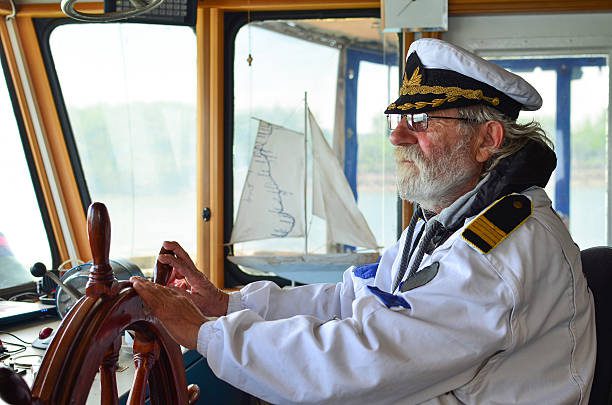
| Ship Captain Key Stats | |
|---|---|
| Education | 4+ Years |
| Job Outlook | 2% |
Ship Captains are nautical experts who use their experience to manage and direct seafaring vessels for a variety of purposes and industries.
Ship Captains manage the course of a ship in order to transport passengers, freight or cargo.
These professionals are trained to manage an assortment of ship vessels although the exact type of vessel will be determined by the type of job they seek.
Some types of vessels these professionals are trained to maneuver include the following:
- Commercial Vessels such as cargo ships, merchant ships and passenger ships such as ferries and cruise ships
- Fishing Vessels are typically smaller in size and used to transport fishing cargo according to international laws and regulations
There are similar responsibilities Ship Captains have no matter which type of vessel they are responsible for.
One important skill an expert Ship Captain must have includes the ability to navigate from one point to another.
A ship will communicate and delegate specific assignments to other ship members such as mates in order to secure safety and meet deadlines.
Although having a love for traveling by sea is a great characteristic to have in order to become a Ship Captain there are several qualifications employers look for in a candidate.
Read below for further information on educational requirements, training expectations, a typical job description and salary information.
Table of Contents
Education Requirements to Become a Ship Captain
The U.S.
Coast Guard has established and currently oversees the educational and training requirements.
In order for a candidate to become a Ship Captain, they must attend and complete a program that meets the U.S.
Coast Guards requirements.
In addition, candidates who want to become a Ship Captain must also meet licensing requirements.
Students who have a high school diploma can seek this type of position as long as they have years of experience and the necessary licensure.
For those who decide to pursue an advanced education, they can join an institution that offers a degree in Marine Science or Marine Engineering.
These types of programs are typically offered at maritime academies or colleges.
Licensure for this profession depends on the type and size of ship candidates will manage.
Licensure will be granted to those who have completed a program at an accredited institution and must pass a written exam.
Ship Captain Job Description
A Ship Captain’s responsibilities will vary depending on the industry and the type of ship they are hired to navigate.
For the most part, a Ship Captain is mainly responsible for planning and directing the route the ship will take based on an exact location and according to a specified schedule.
For example, a Ship Captain leaving from Alaska, a major fishing port will plan a route in order to get to its required destination.
During the voyage, the captain will direct the crew assuring the correct route is taken to avoid getting lost.
A Ship Captain will also need to manage a crew in case of emergencies, such as adverse weather.
A Ship Captain’s responsibilities go beyond directing a ship.
They are also responsible for the crew’s safety.
If they are directing a cruise ship, they will also be responsible for the passenger’s safety.
Ship Captains who manage a fishing vessel will have different responsibilities.
In addition to planning and managing the ship’s route, they will determine the type of fish they will catch, the best location to catch the largest amount, what method the team will use to catch the fish and the duration of the trip.
Ship Captain Salary and Career Path
The career expectations for this industry look excellent according to the Bureau of Labor Statistics (BLS).
In fact, careers in the seafaring profession are expected to grow by 15% through the year 2018.
Factors helping this growth include an increased interest in tourism, international trade and offshore oil and gas manufacturing.
The BLS also reports that the national median wage for professionals in this industry was approximately $61,960 in 2008.The salary range for this position starts at $29,000 to a high of $108,000.
This estimate is based on a variety of positions in this field.
Ship Captains are likely to earn more than the starting salary.
![]() The below information is based on the 2023 BLS national averages.
The below information is based on the 2023 BLS national averages.
National Average Salary
$97,820Average Salary by State
| State | Avg. Annual Salary |
|---|---|
| Alabama | $93,410 |
| Alaska | $87,740 |
| Arizona | $66,660 |
| California | $91,300 |
| Connecticut | $92,700 |
| Delaware | $88,130 |
| District of Columbia | $89,950 |
| Florida | $77,600 |
| Georgia | $96,630 |
| Hawaii | $85,790 |
| Illinois | $88,830 |
| Indiana | $103,470 |
| Iowa | $85,480 |
| Kentucky | - NA - |
| Louisiana | $116,030 |
| Maine | $72,950 |
| Maryland | $101,020 |
| Massachusetts | $71,130 |
| Michigan | $75,340 |
| Minnesota | $99,880 |
| Mississippi | $131,930 |
| Missouri | $77,820 |
| New Hampshire | $76,470 |
| New Jersey | $109,910 |
| New York | $94,280 |
| North Carolina | $67,460 |
| Oregon | $88,950 |
| Pennsylvania | $102,250 |
| Rhode Island | $85,380 |
| South Carolina | $74,420 |
| Tennessee | $104,950 |
| Texas | $114,150 |
| Vermont | $67,390 |
| Virginia | $81,330 |
| Washington | $101,850 |
| West Virginia | $105,810 |
| Wisconsin | $80,780 |
| Puerto Rico | $44,870 |
| Virgin Islands | - NA - |
The top earning state in the field is Mississippi, where the average salary is $131,930.
These are the top 5 highest-paying states in the field:
* Employment conditions in your area may vary.
Frequently Asked Questions
What does a ship captain do?
Ship captains set the course and speed of the vessel, supervise and direct crew members and keep records about the ship.
As a captain you are in charge and responsible for the ship, its cargo, and crew.
You verify the ship’s course and speed, you make sure every equipment works properly, you watch that safety procedures are respected, you are available around the clock.
You will spend most of your time on the water, traveling between different places.
You can be a captain of a supply boat operating in inland waterways or captain of a ship that crosses the oceans of the Earth; the educational requirements are different for each category.
Regardless of the type of vessel you operate, you will need a variety of technical skills but also leadership abilities and communication skills.
Like all mariners, ship captains need physical strength, hand-eye coordination, dexterity, and visual ability.
How much does a ship captain make?
As a ship captain, you can make anywhere between less than $35,000 and more than $140,000 a year.
According to the Bureau of Labor Statistics, in 2017, the median salary for captains, mates, and pilots of water vessels was around $60,180.
How much does it cost to become a ship captain?
Education requirements may vary depending on the type of vessel you want to operate.
Ship captains typically need a bachelor’s degree or a master’s degree in marine operations, marine transportation or a related field.
Tuition costs vary depending on the school you choose and the program itself.
Annual costs at the Massachusetts Maritime Academy sum up to approximately $8,000 for in-state students and around $25,000 for out-of-state students.
There are 19 maritime high schools that prepare students for work in water transportation or for admission at a bachelor’s degree program so if you want to build a career as a boat captain you can start your training in high school.
What is the demand for ship captains?
Overall employment of water transportation workers is projected to decline by 2 percent from 2018 to 2028.
Employment in this field is sensitive to fluctuation in demand for commodities.
Job opportunities also vary region by region.
How long does it take to become a ship captain?
The training requirements for water transportation professions are regulated by the US Coast Guard.
There are six maritime academies: the US Merchant Marine Academy, SUNY Maritime College, Mass Maritime, Maine Maritime, Texas A&M Maritime, and Cal Maritime.
These schools can be completed in 4 years and get you ready for entry-level employment as a third mate, the lowest officer rank.
After finishing your studies you will continue your training with a year at sea.
After gaining one year of experience as a third mate you can be promoted to the second officer rank, then to chief officer and lastly, captain.
You need years of experience to reach this point and the time spent on each level may vary, but you will spend at least one year in each position.
In some cases, you need to take exams in order to obtain the promotion.
If we take into account the education and experience requirements, it can take you up to more than 10 years to become a ship captain.













